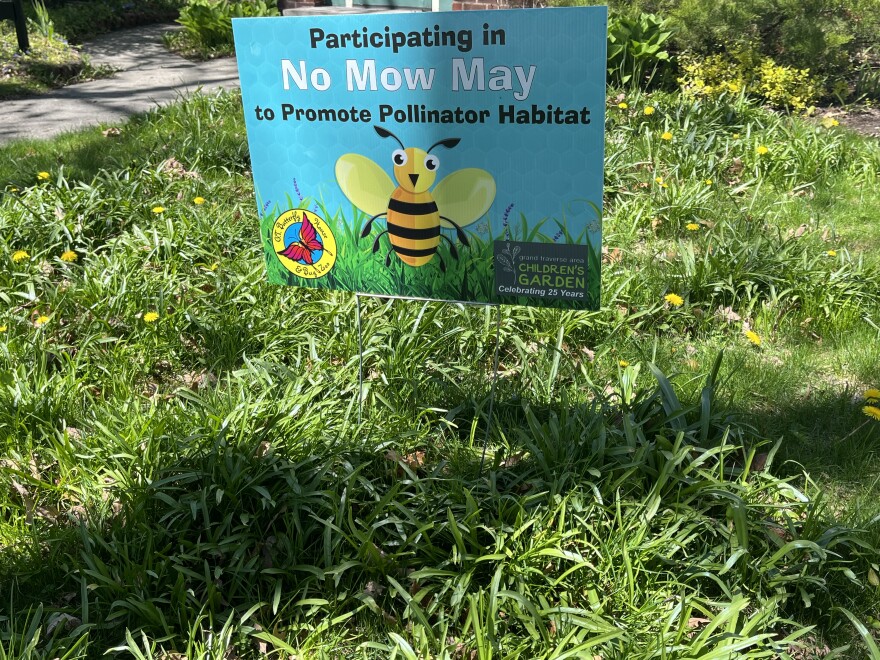This coverage is made possible through a partnership between IPR and Grist, a nonprofit environmental media organization.
Walking around Traverse City, it’s hard to miss the yard signs with a smiling cartoon bee proclaiming “No Mow May.”
The signs are part of a conservation initiative aimed at raising awareness of how lawn care can impact pollinators and plant life.
The "No Mow May" movement started in the United Kingdom and has caught on in other parts of the world. Recently, more Michigan communities have joined in. By mowing less, organizers hope to help feed pollinators, preserve their habitat and benefit the climate.
This spring, the Grand Traverse Area Children’s Garden teamed up with the GT Butterfly House & Bug Zoo to coordinate the effort locally. They ordered 300 signs, supported by a grant from the state Department of Agriculture and Rural Development.
“Traverse City can step up and start thinking about native plants, start thinking about their leaf pickup and make an impact one yard at a time,” said Sarah Kuschell, executive director of the Children’s Garden.
They’re encouraging people to help out pollinators by mowing less, planting native flora, and more carefully considering the use of insecticides.
The Grand Traverse Conservation District, Traverse City Parks & Recreation, Grand Traverse County Parks & Recreation, and some schools in the area are also participating in the initiative, according to a news release.
It’s not the first time “No Mow May” signs have popped up around Traverse City; the Greenspire School promoted it in the past as part of its curriculum.
This year is different, said Cyndie Roach, a curator at the GT Butterfly House & Bug Zoo who helped coordinate the effort.
Roach said “many businesses and community leaders have stepped up to take a stand” to raise awareness about both mowing and the negative effects of various chemical lawn treatments on local plant, insect and animal life.
Traverse City’s noxious weeds ordinance still requires that grass and weeds not grow above 8 inches in lawns. But organizers say people can still participate just by mowing less, or leaving patches of longer grass and plant life.
“We understand — the city understands — that it's a good cause… for the pollinators and what have you,” said Michael Trombley, a code enforcement officer for the City of Traverse City.

Michigan State University Extension reviewed the educational materials handed out with the signs, Kuschell said, and the Children’s Garden also distributed milkweed seeds to participants.
While many pollinator enthusiasts and gardeners have embraced the movement, critics have pointed out pitfalls, saying it would be best to leave lawns alone well beyond May and focus on fostering native plants year-round.
Some horticulturists say the success of these efforts depends on the type of plant life in the yard, and suggest that when people start mowing again, they do so gradually. The University of Minnesota recommends participating in a “Slow Mow Summer” instead.
Roach said that’s actually in line with what they’re doing, which is getting people to think about how gardening, lawn care and insecticides can impact local ecosystems.
“We're creating an awareness that wasn't there before,” she said. “And the awareness surrounds letting native plants, animals and habitat thrive.”


